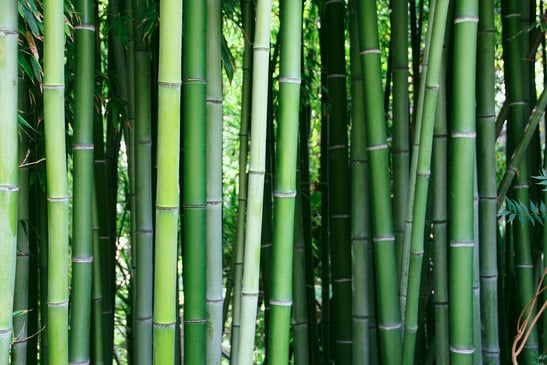Bamboo flooring is becoming a popular and attractive alternative to hardwood flooring because of its cost, durability and eco-friendly properties. Bamboo is a regenerating grass so it grows much faster than hardwood trees, making it more sustainable and environmentally friendly. Flooring made from bamboo is a dimensionally stable product, meaning that it reacts to fluctuating temperature and humidity, so can be used with underfloor heating and floated over an underlay. Bamboo flooring is available in a variety of grains, patterns, colours and finishes at a very reasonable price compared to some hardwood flooring.
How bamboo is eco-friendly
Bamboo grass is native to China and also manufactured in China. It is a regenerating grass that reaches maturity within five years. This makes it an eco-friendly and sustainable alternative to hardwood trees, which do not reach maturity for two or three decades. The bamboo’s grass root is self-generating and is not damaged during harvesting, meaning that it does not need re-planting like trees, making it a very renewable flooring material. To ensure that the forest is not entirely harvested at once, the bamboo plants are colour coded into different seasons, and only cut down after five years once the bamboo is of a mature age. This allows for harvesting of healthy crops of bamboo to take place every year in different sections of the forest.
To ensure that the bamboo flooring you buy is truly eco-friendly, the company selling the flooring should have a Forest Stewardship Council (FSC) certificate for the particular type of flooring you wish to purchase. The FSC is a global organisation devoted to a responsible management approach to the world’s forests. They aim to ensure that the harvest of bamboo (and timber) preserves the natural biodiversity and ecological processes of the forest, whilst following long term forestry management plans. If a company has been awarded an FSC certificate, it means that every company involved in the chain of production of the flooring (farmer, manufacturer and seller) has also been awarded FSC certification.
Bamboo flooring eco-friendly benefits
• Bamboo is a rapid growing grass reaching maturity in five years, compared to around twenty-five years for a tree to reach maturity
• Bamboo is a renewable grass with self-regenerating properties so does not need replanting after a harvest
• Bamboo grows quickly and naturally so there is no need for irrigation systems or fertiliser
• Bamboo forests are carefully harvested by hand
• Bamboo produces around 30% more oxygen than hardwood forests of the same size
• Bamboo grows in China and is manufactured in China, reducing the carbon footprint
It is commonly thought that the manufacture of bamboo flooring in China and then shipping to Europe to be sold, compromises its eco-friendly properties. This may be a slight disadvantage to bamboo as an environmentally material, but it must be highlighted that most European hardwood is felled in Europe, shipped to China to be manufactured, and then shipped back to Europe to be sold, meaning that it travels twice as much as bamboo.








